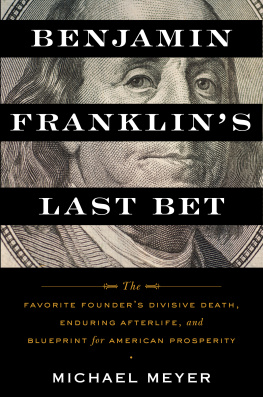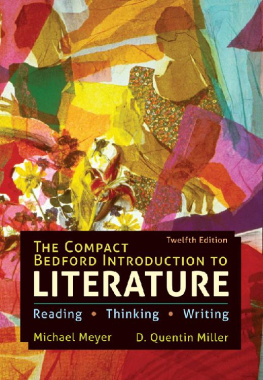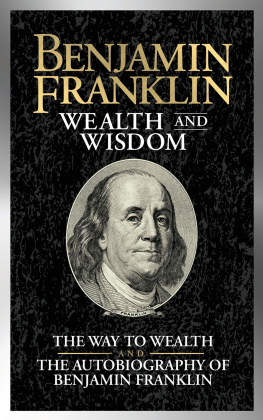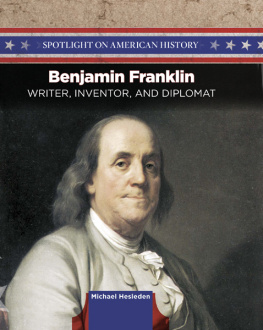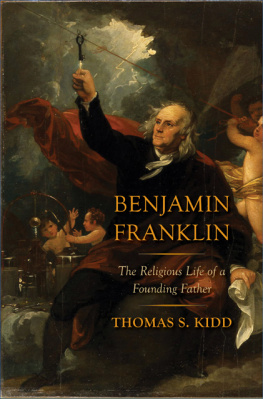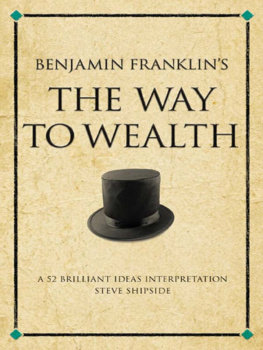Contents
Guide
The Favorite Founders Divisive Death, Enduring Afterlife, and Blueprint for American Prosperity
For Adam Hochschild
and
Georges Borchardt
If you woud not be forgotten
As soon as you are dead and rotten,
Either write things worth reading,
Or do things worth the writing.
Poor Richards Almanack
The meaning of life is that it ends.
Franz Kafka
Contents
I took a wide route to this story, one that its subject might have appreciated. Benjamin Franklin was long fascinated by China, especially its inventions, silk production, and agriculture. In 1770, while living in London, he excitedly mailed a packet of bean seeds to a botanist friend back in Philadelphia. Franklins letter included an account of the universal use of a cheese made of them, in China, which so excited my curiosity. This was North Americas first recorded description of the food that Franklin spelled as Tau-fu.
Packets of Chinese rice and tree seeds followed. After filling a front page of his Pennsylvania Gazette with the sayings of Confucius, Franklin once scored the margins of a travelers account of visiting the Middle Kingdom with his own calculations of the journeys time and costs.
Visiting China proved to be a bridge too far for him, but I made the journey in 1995, as one of its first Peace Corps volunteers. I knew far less about the place on arrival than Franklin would have. But I ended up staying in China for over a decade, and writing a trilogy of books about life in its overlooked corners.
After I moved back to the United States, a fellow Midwesterner I had met in China, working for then vice president Joe Biden, added my name to the guest list for a lunch welcoming the Chinese leader Hu Jintao on his 2011 state visit. I picked my first suit off a Herald Square clearance rack and boarded the train south to Washington, D.C.
When seen from the C Street sidewalk, the U.S. State Department building does, as a critic frowned at its unveiling, look as nondescript as a chewing gum factory. To me, the edifice also appeared incongruously familiar. Its unadorned limestone faade and rectangular rigidity would not look out of place in Soviet Moscow or Mao-era Beijing.
Inside, however, the State Departments plush Diplomatic Reception Rooms belie the buildings exterior austerity. Picture herringbone wood floors the color of fresh honey, Chippendale sofas, brass andirons, Paul Revere silver, and the type of heavy curtains that catch fire in old movies. The luncheon guests did not wear name tags, because everyone seemed to know one another. Even the Chinese officials looked relaxed, which was a first. Barbra Streisand chatted with Colin Powell. Yo-Yo Ma cradled his cello upon a dais.
Feeling self-conscious, I sidled out of the chandeliered dining hall and stepped into an adjoining room, empty of people. Without coincidence, as the Chinese saying holds, there would be no story. As I leaned, exhaling, on a polished writing table, an unseen voice snapped: Please dont touch that.
A young, uniformed Marine guard stepped forward from the wainscoting.
Sorry, I said, straightening, attempting to hide my embarrassment. Is it old?
Thats the table where Benjamin Franklin signed the Treaty of Paris.
I had forgotten that he had done this, let alone what the agreement had settled. The Marine told me that the State Dining Room was named for Franklin, known as the father of the Foreign Service. Franklin was the first American expatriate, the Marine continued. He crossed the Atlantic eight times, and between 1757 and 1785, he spent only three years on American soil. I had been carrying a bit of him on my own travels. Embossed on my blue passport cover was the motto E pluribus unum Out of many, one which Franklin had helped select for the Great Seal.
The Marine pointed to the rooms porcelain sculpture of Franklin and Louis XVI signing the 1778 Treaty of Alliance, which brought crucial French support for American independence. The figurine depicts the twenty-four-year-old king in courtly attire, facing the seventy-two-year-old commoner wearing a beaver-fur-collared robe. The Marine then directed my attention to an oil portrait that shows Franklin dressed in the same simple clothes. In Paris, Franklin played up his Americanness, refusing to powder his shoulder-length hair. Sweating through a cheap, ill-fitting suit, I admiringly added business casual to Franklins long list of inventions.
The lights flickered, calling guests to lunch, and I reluctantly left the erudite Marine. Sitting in the ballrooms farthest seat at the farthest table from the dignitaries, I suddenly felt stupid. I knew far more about Chinese dynasties than the basic foundations of my own country. In China, one constantly hears residents boast of their civilizations five thousand years of history, even if their compatriots have spent nearly as many years smashing its heritage to pieces. There is a profundity in what remains. The dilapidated Beijing courtyard where I had lived predated the American Revolution, and had the plumbing to match. Its neighborhoods dense tangle of alleyways was more than twice as old as the United States itself. History was not in a textbook, but palpable and present. Touching Franklins table at the State Department delivered that same jolt.
If I had previously thought of Franklin at all, I saw a kite. Then his wizened face, smirking on the hundred-dollar bill, and speaking only in gnomic quips like some American Yoda. But, as Poor Richard charitably put it, the Wise and Brave dares own that he was wrong.
Back in my room after lunch, I opened my laptop. Where to begin with Benjamin Franklin? I started with the table. Formerly it had lodged at the Htel dYork, where Franklin and the American delegation had met the British representative to sign the treaty that recognized Americas independence, ending the Revolutionary War. The hotel is gone, but a plaque marks the site, located directly across the Seine from the Louvre. The address, 56 rue Jacob, is now, fittingly, home to a universitys Center for International Studies.
One link led to another. I spent the night clicking Franklin, not suspecting that this was the start of a decade-long trail that would wind through Boston and Philadelphia archives, the Library of Congress (whose central entrance is topped with Franklins bust), his former London town house, and his ancestral Northamptonshire village, nestled amidst fields of beans. To begin with Franklin is to pull on a kite string that keeps pooling at your feet. The man contained multitudes.
Benjamin Franklin invented bifocals, the lightning rod, and a musical instrument called the glass armonica. (Mozart composed a piece for it.) He proved that lightning is electricity, and coined the words electrician, battery, conductor, positive/negative charge, and electric shock. He founded Pennsylvanias first library and fire department, and co-founded its first hospital and college. (All remain open.) He perfected the odometer and the rocking chair. He designed a better catheter and a more efficient stove. He drew the first American political cartoon: a sliced-up snake captioned JOIN, OR DIE . He explained the northern lights and mapped the Gulf Stream. He also invented swim fins. For his own prowess in the water, Franklin was posthumously inducted into the International Swimming Hall of Fame. He once astounded a party by leaping from a boat and swimming three miles from Chelsea to Blackfriars against the strong tidal current of the river Thames.
As Poor Richard, he spun aphorisms that went viral centuries before this was a thing, including Fish & Visitors stink in 3 days and Three may keep a Secret if two of them are dead.

